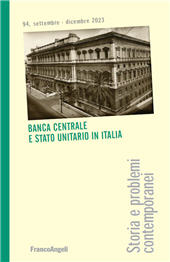La Banca d'Italia nell'era del nation-building : alle origini dell'intervento industriale (1907-1913)
51-71 p.
It is relatively well known that the Bank of Italy intervened to offer temporary relief to banks and firms experiencing financial difficulties in the aftermath of the First World War and once again after 1929, paving the way to the intervention of the State through the direct ownership of banks and industrial firms during the 1930s. This article explores instead the first involvement of Bank of Italy with industry during the last part of Giolittian Age and argues that the Bank's intervention did not stem from a grand design of policy, but it was, rather, a consequence of the substantial failure of the introduction German banking model in Italy. Periodic crises of Italian universal banks destroyed financial capitals and demanded restructuring. After the crisis of 1907, such restructuring usually occurred at the public initiative and with funds provided by the Bank of Italy.
The future central bank played a vital part in the restructuring of some strategic industries, starting from the creation of the Steel trust of 1911. It is also argued here that the Bank's industrial intervention was an outcome of its institutional evolution and, in particular, of the significant role played in the construction of the national state. [Publisher's Text].
Fa parte di
Storia e problemi contemporanei : 94, 3, 2023-
Articoli dello stesso fascicolo (disponibili singolarmente)
-
Informazioni
Codice DOI: 10.3280/SPC2023-094004
ISSN: 1120-4206
MATERIE
PAROLE CHIAVE
- Bank of Italy, central banks, public intervention in industry, crisis of 1907, Bonaldo Stringher, Steel Trust


